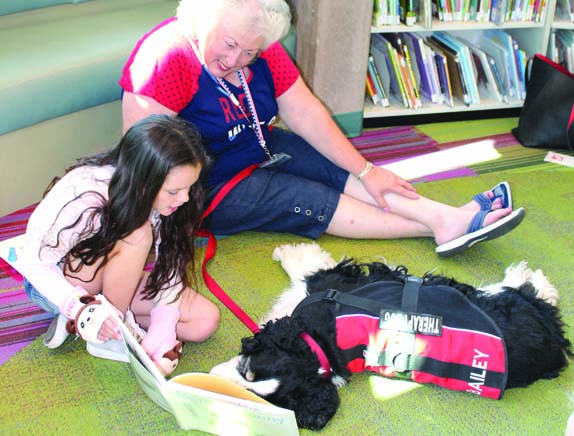
The list of requirements that Bailey fulfilled to land his current job is extensive: proof of certification, proof of up-to-date shots, proof of insurance, two part-orientation at Grossmont Hospital. After successfully completing these and other requirements, he is now legally able to work as a therapy dog.
American Therapy Pets trainer and board member Judy Prevatte, Bailey’s owner, describes the job of a trained therapy pet as being valuable in a myriad of settings, different from both service animals who are purposefully selected and trained to perform specific tasks to mitigate their handlers’ disabilities and emotional support animals who are not required to undergo any specialized training.
“There’s a big difference from service animals— totally, totally different. Really, therapy dogs provide such a wonderful kind of service to the public, unlike a service animal who is trained to help one-on-one. For example, when we go to Grossmont Hospital, we see staff, visitors, technicians, patients, everyone and if he makes you smile, he’s doing his job,” Prevatte said.
There is a rotating list of places where Bailey is welcomed in for therapeutic reasons, including the Alpine library, where children of any reading level are able to read to Bailey.
“One of the most wonderful things about the reading program is that the dog doesn’t care if you make mistakes, doesn’t mind how fast or slow you read, isn’t going to make corrections— there’s no judgement,” Prevatte said.
Bailey Easterling, 9, and Jaden Cobian, 10, have been coming to read with the therapy dog since the Alpine library opened three years ago; both speak of how different they are now—as confident readers— than when they first began to attend the open reading sessions.
“When I first started coming to read to Bailey, I would just lie next to him. Now, I’m used to reading to him. He makes it so easy to just sit and read,” Jaden said Bailey says that she loves going to read with the dog because it is amazing that they have the same name and both go to the same library to read the same books.
“Besides going to the library as part of the reading program, Bailey and I go to Grossmont hospital on Tuesdays, we also go to the Naval hospital and visit pediatrics; last Christmas, Bailey was part of the tree lighting at the hospital as a reindog. We also participate in stress release sessions at Grossmont College and San Diego State University— we go up and spend shifts with students right around finals’ time,” Prevatte said.
American Therapy Pets is the official therapy dog program of the United Services Organization—one reason why Prevatte chose to work with this particular organization— and Bailey is experienced with serving the military.
“We go out and sit with the young marine recruits who are headed off to boot camp at MCRD, waiting for their drill sergeant— some of them have never been away from home, never been on an airplane, and many had a dog at home; we see some of the same people later on after boot camp and they tell us what a difference Bailey made. We also greet the honor flight as it arrives at the airport, which is a very high energy moment,” Prevatte said.
According to Prevatte, dogs like Bailey are not only trained for human interaction, but also to remain calm in the face of stressful situations and around distractions.
In a medical facility, there are crutches and walkers to be avoided, the possibility of dropped items that a dog must ignore, the ability to sense which patients would benefit from interaction and which are not receptive to the situation. Prevatte says that it is necessary for Bailey to be in tune with young children, the elderly, and everyone in between.
American Therapy Pets actively assesses therapy dogs to ensure that they maintain their certifications and provides remedial training for those who are in need of a refresher.
Just to set a paw down at Naval Medical Center San Diego, Bailey had to be completely cleared to work through American Therapy Pets as well as fulfill the requirements set by the Armed Forces YMCA. Prevatte also had to qualify for access as a volunteer.
“Volunteering with Bailey in the community, it is a real passion for me. You have to have an ongoing commitment— it is just as much about the dog handler as about the dog. We don’t just walk in somewhere and plop down with a dog. We’re a team,” Prevatte said.













Thanks for doing such a great job of reporting about all the good Bailey is doing in the community!! I really enjoyed meeting you Jessica!